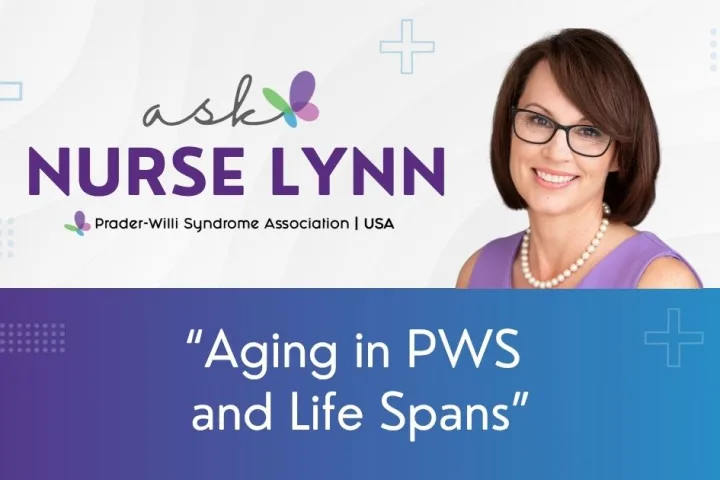Why is it important to talk about food in the PWS community?
As of now, Growth Hormone is the only FDA approved treatment for PWS, and it does not address the hallmark symptom of hyperphagia (excessive hunger). The most common and effective strategies for managing the symptoms of hyperphagia and slower metabolism are through diet and food security. It is incredibly important for caregivers to have access to information about nutrition options and tips for controlling access to food. Discussion on recipes and meal ideas can help broaden a caregiver’s scope of food and nutrition choices, help grow their education around nutrition, and help ease the stress of constantly having to think and prepare food. Diet and food access is something every family must concern themselves with and we offer our community and our loved ones a great service when we can have these discussions. Respectful, open, and knowledgeable conversations about food are a great way to support each other.
Factors that go into people’s food choices
Food is a distinct theme in most, if not all, cultures. In some cases, it defines who we are and where we come from. While a diagnosis of PWS can shake the walls around us, it does not crumble the foundation we stand on. For many families, rice, breads, and pastas are staples in their homes, and they may be hard pressed to follow any recommendations of simply removing them. Thankfully there are many options for more PWS-friendly alternatives in these categories that families can learn through healthy, respectful discussion. There is also the recognition that what works for one family may not work for another. Some families may choose a vegetarian lifestyle, or one free of dairy, and their choices will look different based on that.
- Economic/ Socio-economic
Having access to healthy food is a major problem in our country, and of course beyond. Far too many people live in what are called “food deserts”, places where access to healthy, affordable food is severely limited, if available at all. There are little to no grocery stores or farmers markets for miles. People living in “food deserts” sometimes do not have the time or the means to travel to proper grocery stores and must rely on mini marts and fast-food restaurants. This dramatically limits the food choices these families can make.
We are also living in a time when it often takes more than one person in the home to work to pay bills. Grocery funds may be lower on the list of importance, falling underneath rent, electricity, and medical bills. Having healthy food choices and having the time to prepare that food, especially after a long day at work, are not always compatible.
- Education
Many of us, after receiving a diagnosis of PWS, have had the opportunity to dive into articles, books, and webpages devoted to healthy nutrition. We have had the education that taught us how to research, how to look for the answers we need. We have access to computers, libraries, Amazon accounts, and dieticians. This is not true for everyone, another reason why being able to have healthy, non-judgmental, respectful conversations around food may be critical for families.
- Age/development/phase
We should remember that though our loved ones share a common diagnosis with similar characteristics, they are individuals, in different stages of development and growth. Some are more active than others and may need a higher caloric diet. Just like people without a diagnosis of PWS, children have very different nutritional needs than adults. When discussing nutrition with other PWS families, it is important to remember that there are many factors weighing in on what is right for them.
- Environment
The environment also plays an important role in the food choices for an individual with PWS. Our loved ones do not live in a void, but households or residential facilities where many other factors, including the needs of other members, must also come into play.
- Other Medical Conditions
Besides a diagnosis of PWS, our loved ones may have other medical concerns that dictate what choices they need to make around food. Diabetes, gluten or dairy intolerance, and many other factors can play into the decisions that families must make around food.
How to talk about food in PWS community
Due to the dire importance of nutrition in our loved ones’ lives, it is natural to feel passionate about food choices, and concern when we see a family making choices different from what we perceive they should be making. This is a great opportunity to learn more about why they may be making those choices, or just accept that there are many factors that go into the choices we make around food. It can be beneficial to families to talk about your choices and why they work for your family. These can be moments of learning and inspiration.
Having healthy discussions around nutrition and PWS is a great way to be supportive and find connections with other families. Even if we don’t agree with or understand a family’s choices, we can still find connection. Saying something like, “It can be so frustrating to know what choices to make,” or, “It’s hard to have to think about food all the time,” are great ways to commiserate and connect without judgement.
Ultimately, we are all doing our best with what we have. Let’s have compassion for each other, be respectful, and support each other along the way.
Share this!





 Jennifer Bolander has been serving as a Special Education Specialist for PWSA (USA) since October of 2015. She is a graduate of John Carroll University and lives in Ohio with her husband Brad and daughters Kate (17), and Sophia (13) who was born with PWS.
Jennifer Bolander has been serving as a Special Education Specialist for PWSA (USA) since October of 2015. She is a graduate of John Carroll University and lives in Ohio with her husband Brad and daughters Kate (17), and Sophia (13) who was born with PWS. Perry A. Zirkel has written more than 1,500 publications on various aspects of school law, with an emphasis on legal issues in special education. He writes a regular column for NAESP’s Principal magazine and NASP’s Communiqué newsletter, and he did so previously for Phi Delta Kappan and Teaching Exceptional Children.
Perry A. Zirkel has written more than 1,500 publications on various aspects of school law, with an emphasis on legal issues in special education. He writes a regular column for NAESP’s Principal magazine and NASP’s Communiqué newsletter, and he did so previously for Phi Delta Kappan and Teaching Exceptional Children. Evan has worked with the Prader-Willi Syndrome Association (USA) since 2007 primarily as a Crisis Intervention and Family Support Counselor. Evans works with parents and schools to foster strong collaborative relationships and appropriate educational environments for students with PWS.
Evan has worked with the Prader-Willi Syndrome Association (USA) since 2007 primarily as a Crisis Intervention and Family Support Counselor. Evans works with parents and schools to foster strong collaborative relationships and appropriate educational environments for students with PWS. Dr. Amy McTighe is the PWS Program Manager and Inpatient Teacher at the Center for Prader-Willi Syndrome at the Children’s Institute of Pittsburgh. She graduated from Duquesne University receiving her Bachelor’s and Master’s degree in Education with a focus on elementary education, special education, and language arts.
Dr. Amy McTighe is the PWS Program Manager and Inpatient Teacher at the Center for Prader-Willi Syndrome at the Children’s Institute of Pittsburgh. She graduated from Duquesne University receiving her Bachelor’s and Master’s degree in Education with a focus on elementary education, special education, and language arts. Staci Zimmerman works for Prader-Willi Syndrome Association of Colorado as an Individualized Education Program (IEP) consultant. Staci collaborates with the PWS multi-disciplinary clinic at the Children’s Hospital in Denver supporting families and school districts around the United States with their child’s Individual Educational Plan.
Staci Zimmerman works for Prader-Willi Syndrome Association of Colorado as an Individualized Education Program (IEP) consultant. Staci collaborates with the PWS multi-disciplinary clinic at the Children’s Hospital in Denver supporting families and school districts around the United States with their child’s Individual Educational Plan. Founded in 2001, SDLC is a non-profit legal services organization dedicated to protecting and advancing the legal rights of people with disabilities throughout the South. It partners with the Southern Poverty Law Center, Protection and Advocacy (P&A) programs, Legal Services Corporations (LSC) and disability organizations on major, systemic disability rights issues involving the Individuals with Disabilities Education Act (IDEA), Americans with Disabilities Act (ADA), and the federal Medicaid Act. Recently in November 2014, Jim retired.
Founded in 2001, SDLC is a non-profit legal services organization dedicated to protecting and advancing the legal rights of people with disabilities throughout the South. It partners with the Southern Poverty Law Center, Protection and Advocacy (P&A) programs, Legal Services Corporations (LSC) and disability organizations on major, systemic disability rights issues involving the Individuals with Disabilities Education Act (IDEA), Americans with Disabilities Act (ADA), and the federal Medicaid Act. Recently in November 2014, Jim retired.